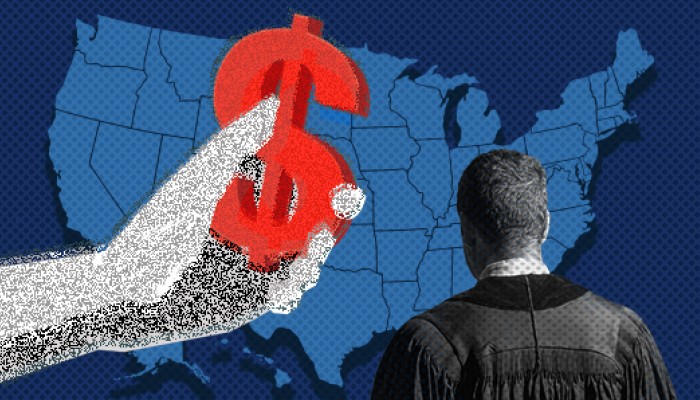The U.S. Supreme Court isn’t the only institution roiled by a highly politicized judicial selection process. In this report, the Brennan Center calls for reform to state supreme courts, where high-cost elections have become the norm. We urge states to abolish elections for state supreme court justices and instead adopt a transparent, publicly accountable appointment process. We also call for the adoption of a lengthy single term for state supreme court justices, along with other reforms designed to rein in the role of money and politics in state courts.
EXECUTIVE SUMMARY
Fair and impartial justice is under threat in state supreme courts across the country. Less than a generation ago, state supreme court elections were subdued affairs. No longer. Today, special interests routinely pour large sums into supreme court races. As of January 2017, 20 states had at least one justice on their supreme court who had been involved in a $1 million election. And during the 2015-16 election cycle, more justices were elected in $1 million-plus elections than ever before. Outside spending by special interest groups — most of which do not disclose their donors — also shattered previous records. Perhaps unsurprisingly, nearly 90 percent of respondents to a 2013 poll said they believed that campaign cash affects judicial decisions.
While the U.S. Supreme Court usually grabs the headlines, state supreme courts play a powerful role in American life. Ninety-five percent of all cases are filed in state courts, and state supreme courts are typically the final word on state law. Their decisions can have profound effects on our lives and on states’ legal and policy landscapes — from whether an Ohio town can regulate fracking, to whether Kansas must increase public education spending by hundreds of millions of dollars, to whether Massachusetts officials can detain people based on a request from federal immigration authorities. At a time when the broken process for confirming justices to the U.S. Supreme Court is in sharp focus, safeguarding state courts as a backstop to defend our rights should be urgent business.
A judge’s job is to apply the law fairly and protect our rights, even when doing so is unpopular or angers the wealthy and powerful. But the reality of competing in costly, highly politicized elections is at odds with this role. If a judge rules against a major donor, will that donor still fund her next campaign? If she angers a powerful political interest, will she face an avalanche of attack ads? These electoral pressures create a morass of conflicts of interest that threaten the appearance, and reality, of fair decision-making. They’re also a roadblock for aspiring judges who can’t tap million-dollar networks.
Left unchecked, these trends can undermine the integrity of state supreme courts and the public trust that undergirds their legitimacy. The implications for American justice are acute.
That’s why the Brennan Center is urging states to reform their systems for choosing judges. We recommend that states do away with state supreme court elections completely. Instead, justices should be appointed through a publicly accountable process conducted by an independent nominating commission. Furthermore, to genuinely preserve judicial independence, all justices should serve a single, lengthy term. No matter the mechanism by which they reach the bench, be it an election or an appointment by the governor or legislature, justices should be freed from wondering if their rulings will affect their job security.
We are not the first to consider reforms to state judicial selection. Over the past 20 years, numerous bar associations, academics, judges, advocates, and other experts have offered ideas about how to mitigate special interest influence in judicial elections, including public financing for judicial races and stronger ethics rules for judges. Many have called for eliminating contested judicial elections. But states have been slow to act. Meanwhile, recent trends — including the increased prevalence of high-cost elections and the growing role of outside interest groups — have created both heightened urgency and new policy challenges.
Our proposals are the result of a three-year project taking a fresh look at judicial selection. We focused on state supreme courts, where the rise of politicized elections has been most pronounced. We studied how each state selects its justices, including individual case studies and an in-depth examination of judicial nominating commissions. We spoke to dozens of experts and stakeholders, reviewed the extensive legal and social science literature on judicial selection, and considered reform proposals from bar associations, legislatures, and scholars.

